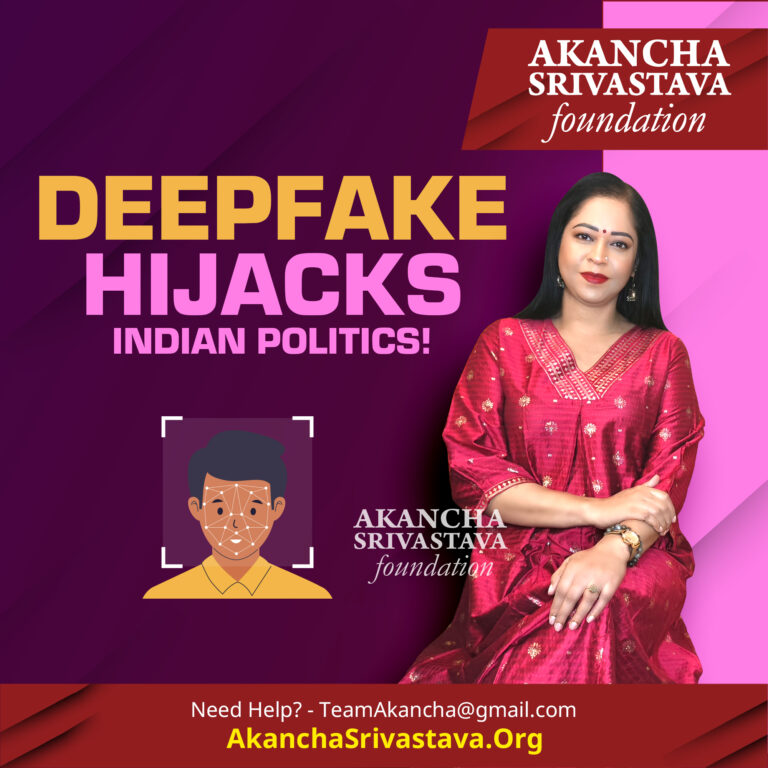Deepfakes are everywhere especiallly during election times.
In the run-up to the 2024 Lok Sabha elections, a deepfake video of Congress leader Rahul Gandhi surfaced on WhatsApp showing him making a communal statement he never made. Around the same time, a fake video of PM Modi appeared on YouTube, fabricated to make it seem like he admitted to policy failures. Both videos went viral before any official clarification could stop their momentum. By then, the damage was done—public opinion had already been influenced.
These are not isolated incidents. Deepfakes have now become a full-fledged tool of political warfare in India. AI-generated content is being used to spread false narratives, impersonate public figures, and emotionally manipulate voters. Political parties, influencers, and cyber operatives are deploying such content to discredit opponents or build fake consensus on sensitive issues like religion, nationalism, and economic policy.
The technology behind deepfakes involves training generative AI models using large amounts of video and audio data of a specific individual. Facial recognition, voice cloning, and natural language processing tools are combined to create synthetic footage that mimics speech patterns, tone, and expressions with chilling accuracy. These videos are then disseminated via closed groups on Telegram, WhatsApp broadcast lists, and anonymous social media accounts.
The creation process of a political deepfake typically begins by collecting hours of publicly available video and audio footage of the target—usually from interviews, speeches, and social media. This data is used to train machine learning models that map the person’s facial movements and voice inflections. Software like DeepFaceLab or FaceSwap overlays the AI-generated visuals onto another speaker’s face. Voice cloning tools then replicate the speaker’s tone and rhythm to produce seamless, realistic audio. Once generated, the final video is polished using editing tools and released through anonymous channels to maximise impact while hiding the creator’s identity.
The objective is clear: distort facts, incite emotional reactions, and shift electoral outcomes. For instance, during Telangana’s state elections, a deepfake clip showed a regional leader endorsing another party. Within 4 hours, the video was viewed over 2 million times before any fact-check could refute it. By then, voter perception had already shifted. This isn’t just misinformation—it’s mass-scale behavioural manipulation.
Citizens must be alert and responsible. Do not trust or forward sensational political videos without verifying them from trusted news sources. No matter how real a video may appear, remember—AI can manufacture complete lies with absolute precision. Always pause, verify, and report suspicious content to help stop the spread of digital disinformation.
Those behind these operations include political IT cells, bot farms, and foreign influence networks. Some work for ideological gain, others for direct monetary reward. Deepfakes are also used to provoke communal clashes by attributing inflammatory speeches to leaders from rival communities. These tactics have already led to police action in states like West Bengal, Karnataka, and Uttar Pradesh, where videos sparked real-world unrest.
To counter this, India needs a multi-layered response. First, existing cyber laws under the IT Act must be amended to explicitly criminalise synthetic media used for public harm. Second, election commissions and news agencies must deploy deepfake detection tools in real time. Third, voters must be educated to verify content before sharing. Lastly, tech platforms must be legally compelled to label AI-generated videos and take down malicious deepfakes within strict timeframes.
This is not a technical issue—it’s a threat to democratic integrity. Every citizen must understand the scale and danger of AI-powered manipulation in today’s politics. When truth can be manufactured, trust collapses.
Subscribe to our channel, share this video, and help spread awareness. Don’t fall for engineered lies—stay sharp, stay informed.
🔔Subscribe for more cyber safety insights!
👍 Like, share & comment to spread awareness!
Stay Aware, Stay Safe. Jai Hind, Jai Bharat.
Sources- How Deepfakes Are Being Used in Political Manipulation in India
- Coverage highlighting the role of AI and deepfakes in India’s 2024 elections and disinformation tactics.en.wikipedia.org+15digitalfutureslab.in+15newlinesmag.com+15
CONTACT US:
Website: www.AkanchaSrivastava.Org
Email: TeamAkancha@gmail.com
Twitter: @AkanchaS
Instagram: @akanchas
https://www.instagram.com/akanchas/
Facebook:
https://www.facebook.com/akanchasrivastava1
LinkedIn:
https://www.linkedin.com/in/akanchasrivastava/
ABOUT ‘AKANCHA SRIVASTAVA FOUNDATION’
The Akancha Srivastava Foundation is India’s leading social impact initiative dedicated to advancing cyber safety awareness and education. Established in February 2017, this not-for-profit Section 8 organization is a trusted voice in promoting safe online practices across the nation.
Distinguished Board of Advisors
Guided by an honorary advisory board of esteemed leaders:
- Former Special DGP RK Vij (Chhattisgarh Police)
- ADG Navniet Sekera (Uttar Pradesh Police)
- ADG Krishna Prakash (Maharashtra Police)
- Dr. Poonam Verma (Principal, SSCBS, Delhi University)
Our Mission
The Foundation is committed to educating, empowering, and building bridges between the public and authorities on critical cyber safety issues. Additionally, we specialize in forensics training for law enforcement, equipping them with the skills needed to tackle cybercrime effectively.

